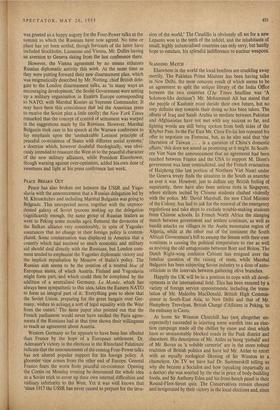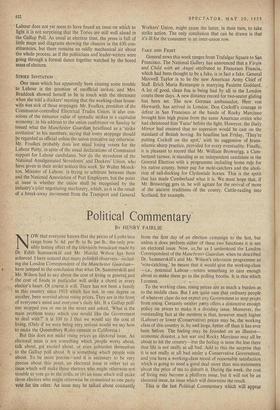SLANGING MATCH
Elsewhere in the world the local bonfires are crackling away merrily. The Pakistan Prime Minister has been having talks in New Delhi, the most concrete result of which seems to be an agreement to split the unique library, of the India Office between the two countries (The Times headline was 'A Solomon-like decision'). Mr. Mohammed Ali has stated that the people of Kashmir must decide their own future, but no very definite step towards their doing so has been taken. The efforts of Iraq and Saudi Arabia to mediate between Pakistan and Afghanistan have not met with any success so far, and fighting words are still being spoken from both sides of the Khyber Pass. In the Far East Mr. Chou En-lai has repeated his offer to negotiate on Formosa, but, as he also said that 'the liberation of Taiwan . . . is a question of China's domestic affairs.' this does not sound as promising as it might. In South- ern Viet Nam the announcement that an agreement had been reached between France and the USA to support M. Diem's government was later contradicted, and the French evacuation of Haiphong (the last portion of Northern Viet Nam) under the Geneva treaty finds the situation in the South as anarchic as ever it was. However, just to deflate any British feeling of superiority, there have also been serious riots in Singapore, where strikers incited by Chinese students clashed violently with the police. Mr. David Marshall, the new Chief Minister of the Colony, has had to ask for the renewal of the emergency regulations and take steps to exclude trouble-making students from Chinese schools. In French North Africa the slanging match between government and settlers continues, as well as bandit attacks on villages in the Aures mountains region of Algeria, while at the other end of the continent the South African Government's bill to swamp the Senate with their own nominees is causing the political temperature to rise as well as reviving the old antagonisms between Boer and Briton. The Dutch Right-wing coalition Cabinet has resigned over the familiar question of the raising of rents, while Marshal Bulganin has been subjecting Soviet industry to a dose of auto- criticism in the intervals between gathering olive branches. Labour does not yet seem to have found an issue on which to fight it is not surprising that the Tories are still well ahead in the Gallup Poll: As usual at election time, the press is full of little maps and diagrams showing the chances in the 630 con- stituencies, but there remains an oddly mechanical air about the whole process, as if the politicians and leader-writers were going through a formal dance together watched by the bored mass of electors.











































 Previous page
Previous page